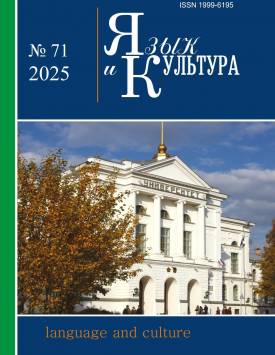The problem of using foreign textbooks in extra language education for adults in modern geopolitical situation
In recent years, Russia has faced challenges related to preserving its unique cultural identity in a multicultural environment. This article examines the role of a foreign language as a means of intercultural communication and a tool for the formation of cultural identity of students. Special attention is focused on additional education, where linguistic training for adults opens up new opportunities for the formation of Russian cultural identity, awareness of one's own cultural identity. Learning foreign languages as part of additional programs allows not only to develop language and speech skills and abilities, but also to expand knowledge about the culture of other countries, contributing to comparative analysis with Russian culture, as well as developing critical thinking and cultural awareness. In this context, educational and methodological complexes play a central role, ensuring the integration of various educational resources, which contributes to systematic learning and the achievement of students' educational goals. The article emphasizes the importance of textbooks and educational materials in modern educational processes, their impact on the possibilities of developing Russian cultural identity. Foreign educational and methodological complexes have traditionally been used in the system of domestic additional education. The authors emphasize that despite the geopolitical situation of recent years, the use of foreign teaching materials in the educational process remains appropriate, since students in additional education should not, according to the authors, lose information contact with materials originating from the country of the language being studied. It is noted that this approach also carries a number of risks associated with a possible underestimation of the need to develop the national cultural identity of students. The authors analyze the most popular foreign textbooks and conclude that all educational and methodological complexes are based on a communicative approach to teaching a foreign language and are intended for students who want to learn general English. The textbooks are designed for an adult contingent of students who seek to use a foreign language as a means of communication in travel, correspondence, for reading and understanding fiction, watching films, listening to musical texts in English. The article provides an analysis of the most common foreign textbooks according to the criteria identified by the authors and assesses how the dialogue of cultures is presented and how possible it is to use foreign manuals for the development of Russian cultural identity of adults when teaching a foreign language. It is noted that if the native culture is presented in fragments or not at all, the teacher should be ready to search and prepare appropriate materials. Modeling of various communicative situations of intercultural interaction, their discussion and search for possible solutions is of crucial importance in preparing adults for a real dialogue of cultures and the development of Russian cultural identity. According to the authors of the article, traditional grammatical topics should be associated with the cultural component, focusing on the specifics of the grammatical structures of the native and studied language, thus forming a mental and behavioral image of Britain and the USA in the minds of students. Special attention should be paid to the study of modal forms, rules for the coordination of tenses, the imperative mood of the verb, active and passive voice, the order of words in a sentence. It follows from the analysis of textbooks that foreign textbooks have both their advantages and disadvantages, their complete exclusion from the process of teaching a foreign language to adults seems impractical. The authors conclude that the main material for teaching foreign languages should be published on the territory of the Russian Federation. However, the combined use of various educational materials, including foreign teaching materials, contributes to the mastery of authentic English and the formation of Russian cultural identity. The author declares no conflicts of interests.
Keywords
foreign language teaching, Russian cultural identity, intercultural communication, foreign textbooksAuthors
| Name | Organization | |
| Oberemko Olga G. | Nizhny Novgorod State Linguistic University named after N.A. Dobrolyubov | ogoberemko@lunn.ru , dolober@rambler.ru |
| Lukianova Elena A. | Nizhny Novgorod State Linguistic University named after N.A. Dobrolyubov | eamalutina@lunn.ru , exert91@ya.ru |
References

The problem of using foreign textbooks in extra language education for adults in modern geopolitical situation | Yazyk i Kultura – Language and Culture. 2025. № 71. DOI: 10.17223/19996195/71/9
